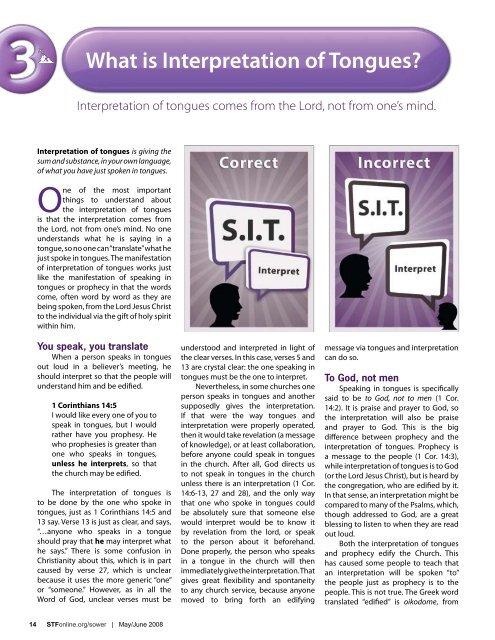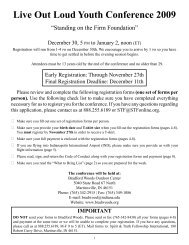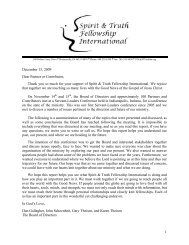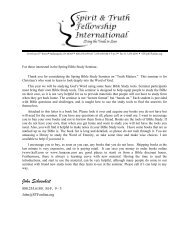Walking - Spirit & Truth Fellowship International
Walking - Spirit & Truth Fellowship International
Walking - Spirit & Truth Fellowship International
Create successful ePaper yourself
Turn your PDF publications into a flip-book with our unique Google optimized e-Paper software.
What is Interpretation of Tongues?Interpretation of tongues comes from the Lord, not from one’s mind.Interpretation of tongues is giving thesum and substance, in your own language,of what you have just spoken in tongues.One of the most importantthings to understand aboutthe interpretation of tonguesis that the interpretation comes fromthe Lord, not from one’s mind. No oneunderstands what he is saying in atongue, so no one can “translate” what hejust spoke in tongues. The manifestationof interpretation of tongues works justlike the manifestation of speaking intongues or prophecy in that the wordscome, often word by word as they arebeing spoken, from the Lord Jesus Christto the individual via the gift of holy spiritwithin him.You speak, you translateWhen a person speaks in tonguesout loud in a believer’s meeting, heshould interpret so that the people willunderstand him and be edified.1 Corinthians 14:5I would like every one of you tospeak in tongues, but I wouldrather have you prophesy. Hewho prophesies is greater thanone who speaks in tongues,unless he interprets, so thatthe church may be edified.The interpretation of tongues isto be done by the one who spoke intongues, just as 1 Corinthians 14:5 and13 say. Verse 13 is just as clear, and says,“…anyone who speaks in a tongueshould pray that he may interpret whathe says.” There is some confusion inChristianity about this, which is in partcaused by verse 27, which is unclearbecause it uses the more generic “one”or “someone.” However, as in all theWord of God, unclear verses must beunderstood and interpreted in light ofthe clear verses. In this case, verses 5 and13 are crystal clear: the one speaking intongues must be the one to interpret.Nevertheless, in some churches oneperson speaks in tongues and anothersupposedly gives the interpretation.If that were the way tongues andinterpretation were properly operated,then it would take revelation (a messageof knowledge), or at least collaboration,before anyone could speak in tonguesin the church. After all, God directs usto not speak in tongues in the churchunless there is an interpretation (1 Cor.14:6-13, 27 and 28), and the only waythat one who spoke in tongues couldbe absolutely sure that someone elsewould interpret would be to know itby revelation from the lord, or speakto the person about it beforehand.Done properly, the person who speaksin a tongue in the church will thenimmediately give the interpretation. Thatgives great flexibility and spontaneityto any church service, because anyonemoved to bring forth an edifyingmessage via tongues and interpretationcan do so.To God, not menSpeaking in tongues is specificallysaid to be to God, not to men (1 Cor.14:2). It is praise and prayer to God, sothe interpretation will also be praiseand prayer to God. This is the bigdifference between prophecy and theinterpretation of tongues. Prophecy isa message to the people (1 Cor. 14:3),while interpretation of tongues is to God(or the Lord Jesus Christ), but is heard bythe congregation, who are edified by it.In that sense, an interpretation might becompared to many of the Psalms, which,though addressed to God, are a greatblessing to listen to when they are readout loud.Both the interpretation of tonguesand prophecy edify the Church. Thishas caused some people to teach thatan interpretation will be spoken “to”the people just as prophecy is to thepeople. This is not true. The Greek wordtranslated “edified” is oikodome, from14 STFonline.org/sower | May/June 2008
















